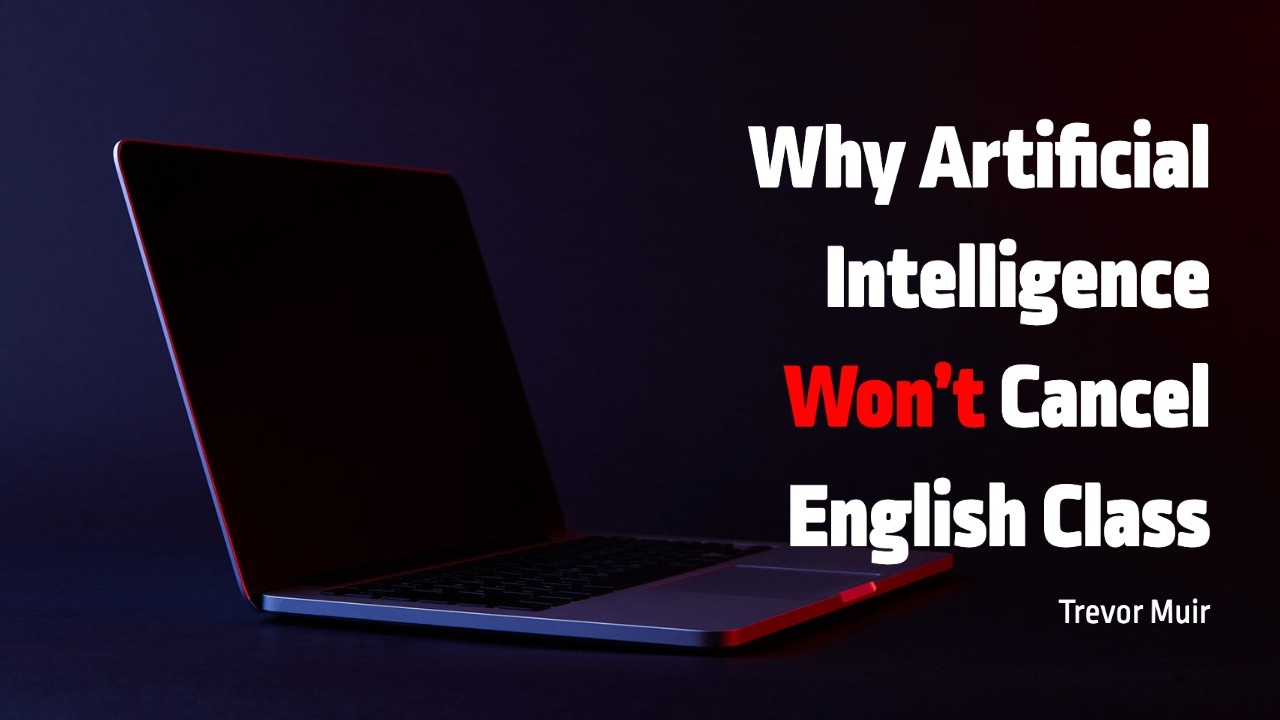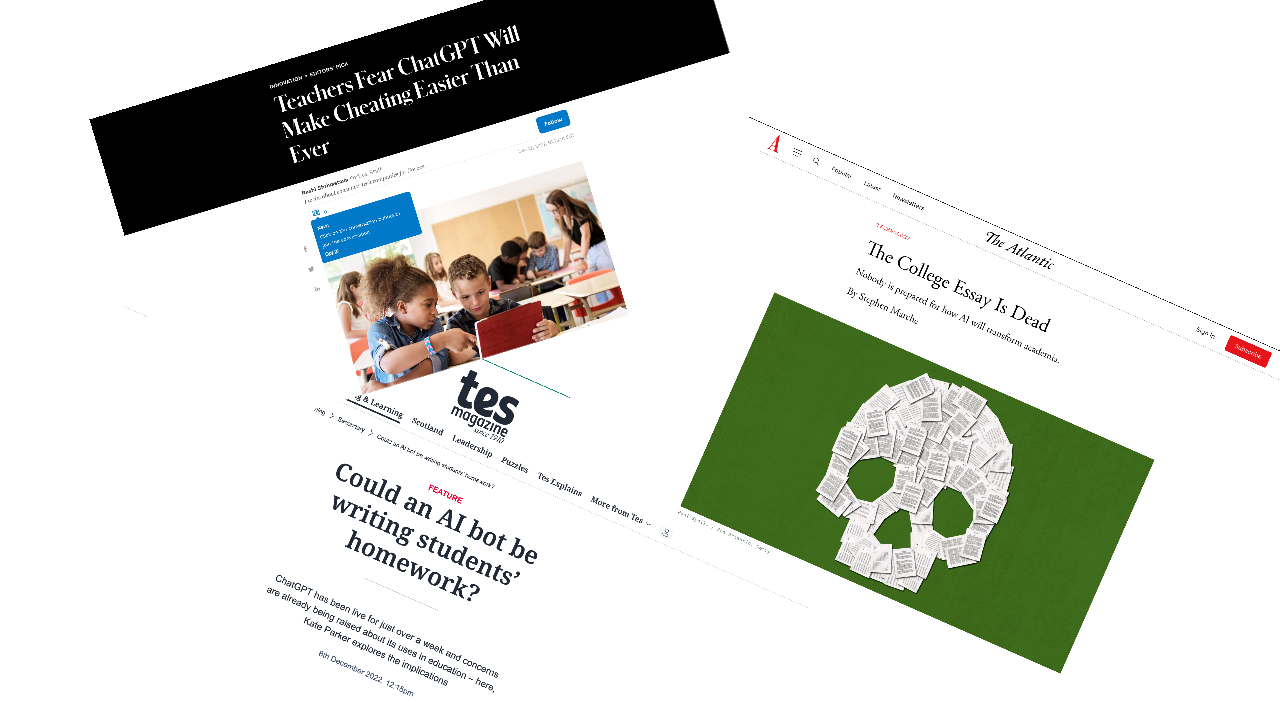
Why Artificial Intelligence Won't Cancel English Class
Dec 13, 2022Last week Artificial Intelligence technology called ChatGPT was introduced and it’s got a lot of people freaking out.
The Atlantic had a headline that asks, “Is the College Essay Dead?” A Forbes headline says, “Teachers Fear ChatGPT Will Make Cheating Easier Than Ever.” TES Magazine asks, “Could an AI bot be writing students’ homework?”

The reason there’s a bit of alarm right now is that this technology can actually write for you. You can put in a prompt or ask a question and within seconds the AI will give you a response, with sometimes startling accuracy. A professor at Amherst College graded an essay this program wrote, and even gave it an A. And it’s not plagiarizing other people’s work while doing this, it’s synthesizing writing from all over the internet and composing it in an original way.
You can see why this might raise the hackles on an English teacher's neck.
Writing can be hard work, and if you can bypass that hard work by using artificial intelligence, why wouldn't you? Why wouldn’t students just cheat by using this?
This will shake-up education.
This is going to cause a shakeup in education; how could it not? But isn’t that kind of the nature of education? Did you know in the 1970’s when calculators started to become widespread, they were banned in most schools? And yet, in 1975, calculators were in 1 in 9 American homes. Meaning they could ban them all they wanted at school, but they were still being used at home to solve math problems. And within a decade, the College Board was mandating their use on the AP exam, and by 1990 they were being used in every school in the country.

And I don’t think this was just a result of educators throwing up their hands and saying, "If you can’t beat ‘em, join ‘em." No, if you look at this history, you’ll see it’s because educators realized students can do more complex math with the use of a calculator. But educators first had to figure out how to take advantage of that technology.
Facing the fear of more cheating.
A lot of the worry is that ChatGPT is just going to do all the thinking instead of students having to do it. Instead of doing the research and then writing a thoughtful essay comparing the themes of Shakespeare and modern politics, students will just write that prompt into ChatGPT and it’ll kick out a completely original essay on that topic.
That is a legitimate fear. I know when I was in high school (and some of college if I'm being honest) that’s what I would have done. But since artificial intelligence didn’t exist when I was in high school, I often BS’d essays like that. I learned quickly in my adolescent years that these types of papers were pretty formulaic. If I could just plug surface-level information into the 5 paragraph structure, I could get the grade I needed and move on.
Now, did writing that 5 paragraph, surface-level essay make me a strong writer? Or did it just confirm my ability to BS an essay? Because that’s what artificial intelligence largely does. It finds the information and strings it together in a passable way. And if that’s what we’re asking students to do with prompts like that, what’s the point? Why are we wasting their time and ours with something we know isn’t producing better writers or even demonstrating understanding of the material? Is it because some test says we have to?
We need to adjust what writing in school looks like.
What AI cannot do is mimic a writer’s unique voice. It can’t use personal stories and anecdotes to connect with what students are learning. ChatGPT may be a good writer, but it’s not a great one. Because great writers are original and do something only they can do, which is create from their unique perspective. That’s what we have to teach students to do. That’s what standardized testing, if we’re going to keep that around, needs to be about.
ChatGPT is not going to end English class, but I think it will change it. I think it will force us to examine the work we give to students. We all know that writing 5 paragraph essays is not part of the daily routine for most adults. So maybe it’s time that ship sails off into the sunset. But there’s lots of practical writing we do do in our lives.
We write emails. We send memos. We write in journals. Some of us try to write thoughtful social media posts. And if we learn to love expressing our thoughts and ideas in written form, we write poetry, and stories, and podcasts, and videos, and blog posts (like this one). So maybe writing instruction needs a practicality update, and maybe love-of-writing needs to be amplified more than formulaic writing.
Easier said than done, of course, but I think that’s our challenge. That’s our pivot.
Let's use technology to enhance student work.
Instead of rejecting this new technology, or trying in vain to block it on school servers or hide it from students, what if we used it to inspire better writing? For instance, let’s say you want your students to examine and then write about the impact Covid had on student learning. They could type this prompt into ChatGPT: What impact did covid have on student learning in America? and receive this response: The Covid-19 pandemic had a significant impact on student learning in America. Many schools were closed for extended periods of time, and many students had to switch to remote learning. This disrupted the educational process for many students, and some may have fallen behind in their studies as a result. Additionally, the pandemic may have had a negative impact on students' mental health and well-being, which can also affect their ability to learn.
Two things: first, this response is not very meaty, but it’s got some strong key points, which is a starting point for writers. From here, students could take the line, “Negative impact on mental health,” and type that back into the software and maybe receive a more detailed response. But if the next response is not comprehensive enough, which it wasn't when I tried it (lacking data and evidence) they can use Google to find those details they’re looking for.
It’s like the AI is helping them skip a step, which is true, but don’t we all want to find the best route to where we’re going? If this tool eliminates some time spent researching, doesn’t that provide more time to dig deeper, work on craft, and enhance the writing?
Second thing: if I added to this writing prompt: What impact did covid have on student learning in America and how does this compare or contrast to your experience?- now students need to write something that artificial intelligence cannot. This personal element forces students to think critically and express their thoughts in the written form. It also might be more inspiring for students to write because it's personal and they can connect with it. And, it might be more pleasant for their teachers to read and grade because they’re not reading the same paper and same responses over and over again.
ChatGPT and AI is not abolishing the need for writing instruction.
This doesn’t abolish English class, but it actually might enhance it. However, that requires some shifting of the paradigm. And there are always road bumps when we do that. We might have to change the assignments we give to reflect this new reality. Oral exams where students have to verbally articulate their learning might need to replace some of those writing assignments, and educators will need to develop better rubrics for that. Maybe we need to emphasize class discussion and teach students how to talk to each other about what they think and what they’re learning.
Instead of blocking this tool from students, maybe we need to teach students how to use it. How can it be a research tool? How can it assist in sparking ideas? How can AI be used to save time in some aspects of writing so you can give more to others?
Some students will still use it to cheat or BS papers, but from a former school-cheater, they were probably going to do that anyway.
Educators and schools needs to pivot.
When the printing press was invented in 1440, educators had to pivot. When calculators started solving math problems by simply pressing buttons, educators had to pivot. When the internet was introduced, we had to pivot. I remember in high school having to use a manual to create in-text citations. Now you can go on EasyBib and it’ll do it for you. You know what that means? We probably don’t need those manuals anymore.
We’ve pivoted.
There’ll be some road bumps and changes that come from all of this, but educators are used to those. It’s in the nature of the work. But what doesn’t change in education is its primary mission, which is to help students find success. Success as writers, thinkers, problem solvers, as people. So let’s keep our eyes on that prize and use the tools and resources at our disposal to do so.
Listen to the The Epic Classroom podcast episode on this subject here.
Stay Connected With Trevor's Work
Join thousands of educators who receive weekly articles, videos, and inspiration from Trevor.
SPAM is the worst. I promise to only send you my best stuff and NEVER to share your email.

